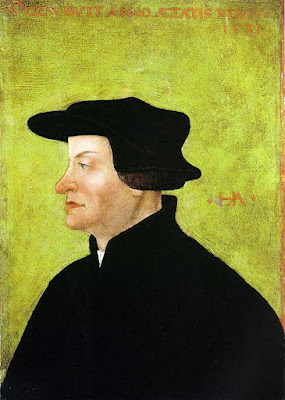In 1517, Martin Luther wrote the “Ninety-Five Theses,” a written attack on the Catholic Church. Luther may or may not have pinned this document onto the door of All Saints’ Church. Regardless, this is often dated as the beginning of the “Protestant Reformation.” You could argue that there were other proto-Protestant groups before that. However, this audiobook basically begins in the sixteenth century. That is, it begins at the traditional date of the Protestant Reformation in 1517. It then gives a brief overview of some of the major branches of Protestant Christianity. Incidentally, the name “Protestant” comes from past protests against the Catholic Church. Today, relations between Catholics and Protestants tend to be somewhat better than they were in previous centuries. That is, they no longer tend to be violent.
Martin Luther
There are so many branches of Protestant Christianity that it’s hard even to keep track of all of them. Thus, a large portion of this audiobook is taxonomic. That is, it tries to give a general classification of the major Protestant groups. This is partly a history of Protestantism, which begins in the sixteenth century. It then goes until the late twentieth century, the time in which this audiobook was made. But it also has a major focus on the ideas involved. Many other histories of Protestantism focus mainly on politics and intergroup conflicts, including the violent religious wars. This audiobook certainly mentions these things, but the focus here is on the ideas involved. These ideas are presented by quotations from major religious documents, from Martin Luther’s Polemics to the Anglican Book of Common Prayer. Most other histories of Protestantism tend to gloss over these things, finding these writings to be too “dense” to quote at length. But this audiobook dives right into the complicated details of these ideas, making this presentation a bit more philosophical than most other histories of Protestantism.
John Calvin, whose ideas influenced many churches (including the Presbyterian Church)
John Knox, founder of the Presbyterian Church in Scotland
Protestants are a significant minority of the world’s Christians. That is, they seem to account for a little over one-third of the world’s Christian population. But their numbers may be even higher – given that some of them simply identify as “Christians,” or even as particular religious denominations. That is, not all Protestants may call themselves “Protestants.” In the United States, Protestant churches include Evangelicals, Methodists, Baptists, and many other groups. Like its mother country of Great Britain, the United States has a strongly Protestant heritage. But unlike its mother country, the United States began enshrining religious freedom as early as the eighteenth century. This is part of why there are so many Protestant churches in the United States. Protestantism is also associated with many European countries as well. Nonetheless, it also has a presence in Korea, Africa, and even Latin America – traditionally a Catholic stronghold. The audiobook is written by a professor from Vanderbilt University Divinity School, a secular school in the United States. Thus, it is hard to determine what the author’s religious views are. He may or may not be a Protestant himself. He does a good job of hiding most of his views, and mostly portrays the Protestant groups favorably – presenting them as they would present themselves.
Huldrych Zwingli, Swiss theologian
John Wesley, founder of Methodism
Thus, this audiobook strikes me as a great introduction to some of the major branches of Protestant Christianity. I have covered Orthodox and Roman Catholic Christianity in my review of another audiobook by the same company. And I will leave it to a website to cover my own version of Christianity (which I disclose here, for anyone who is interested).
If you liked this post, you might also like:
Part of an audiobook series
Religions, Scriptures, and Spirituality
Protestant Christianity
Others to be covered later
See also the audiobook series
The World of Philosophy
Socrates
Stoics and Epicureans
Avicenna and Medieval Muslim Philosophy
Voltaire and Rousseau
Others to be covered later
Stoics and Epicureans
Avicenna and Medieval Muslim Philosophy
Voltaire and Rousseau
Others to be covered later









No comments:
Post a Comment